Diesel Fumes, Dictatorship, and the Most Beautiful City You’ve Never Been To
In Havana, everything important goes unsaid.
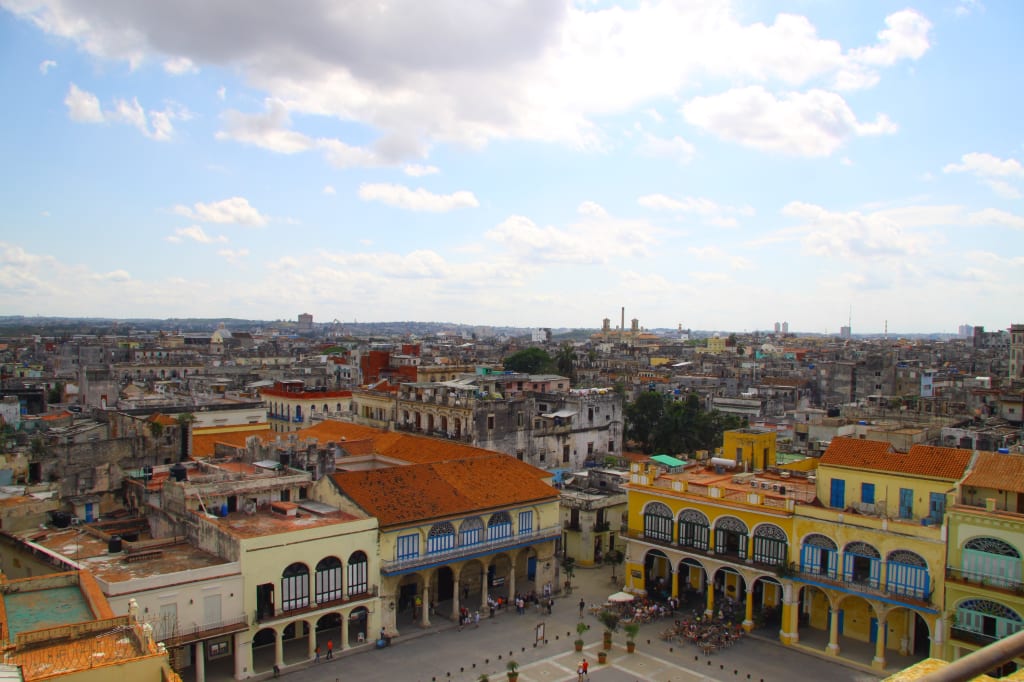
The fumes of Havana filled the street.
The diesel stink contaminates everything. The famous cars, meticulously maintained since the 1950s, look gorgeous in photographs but suck the oxygen out of the breathless air.
The heat doesn’t help. It hit us like a wall the moment we stepped off the bus. Immediately, a man descended on us, asking the usual questions of the too-friendly local. Where are you from? I have a cousin there! Leaving him and his fictional family behind, we lost ourselves in the chaos of the streets.
On the roof, we were able to get above the hot exhaust. The old elevator strained manfully, its antique folding lattice rattling as we rose from floor to floor.
The darkness of the room was a relief from the gritty sun as we stepped inside and closed the door behind us. A thin, dark-skinned man with deep vertical grooves in his cheeks pulled on a dangling rope, and the world outside came flooding in.
Camera obscura sounds better than dark room. But that’s exactly what it means. And that’s what it was, up there on a Havana rooftop. A piece of visual trickery that seems like magic, even if the explanation is simple enough.
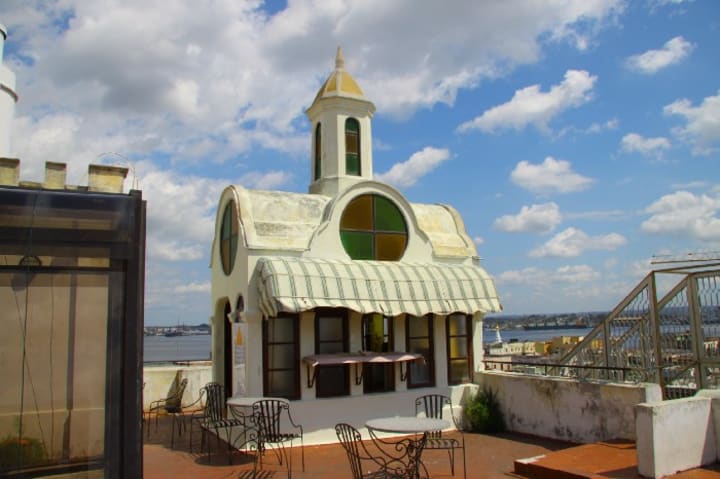
A small hole in the wall will project the outside world, reversed and inverted, onto the opposite wall. A little trickery with mirrors can straighten the image back out. In Havana, the crumbling city and the bright sky shone on a circular canvas stretched out like a table in front of us.
“This is the famous Havana Hilton that became the headquarters of the government during the Revolution,” the guide explained. He spoke English with confidence and cadence, giving it the lilting rapidity of Spanish. A wooden stick, carved into a spiral, pointed out the city’s features while his free hand pulled ropes hidden in the darkness. The bright pinhole of light turned to take in more of the town.
“And over here on this balcony, a woman was hanging her laundry in a short skirt, but now she is not there anymore.” Muted laughter. He probably makes that joke every day.
Havana has been beautiful forever.
It was made that way, with soaring spires and bright squares and cool colonnades offering shelter from the sun. But half a century of economic blockade has managed to make the city even more appealing to visit, though not to live in. There are no McDonalds here. No Starbucks or Sephoras.
The touristed heart of the Old Town has been restored to its colonial glory by a government that understands the power of appearances. But you don’t need to go far to find buildings with gaping windows open to the sky. Walls that sag and roofs that lie in ruins on the broken floor. In buzzing bars, tree roots run wild across the floor. Huge cockroaches saunter unhurriedly down the street.
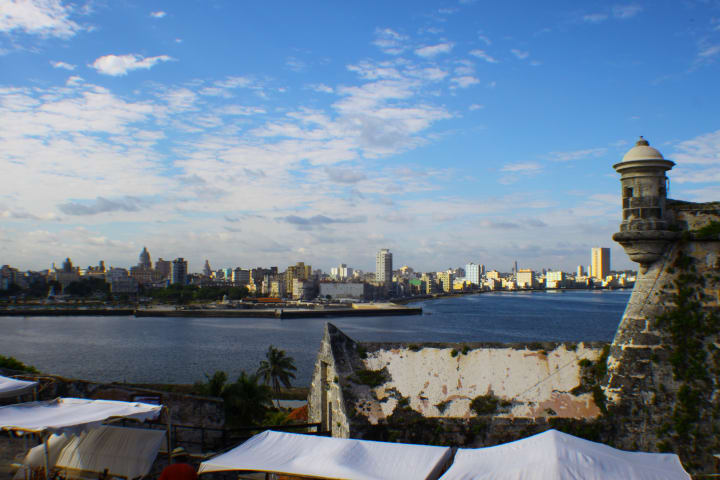
It’s ravishing. Along the malecon, the street that sweeps along the seafront, old cars belch out smoke and sagging buildings face the sky. It’s the decay, the decline, that makes it so unforgettable, a beautiful girl with a scar on her face. And over it all, the dense fog of totalitarianism.
Cubans don’t talk about politics. It isn’t safe. When we visited, Fidel Castro was still alive, still in charge, still wearing the military fatigues he wore when he drove the Americans out of the island and made his country a pariah.
“This is for fire.”
In a beautiful square overlooking the azure ocean, I browsed the items at a market stall. Some official-looking badges had caught my eye.
“This is police,” the stall owner explained, holding up another badge. “And this one is for…government police.” I nodded. In Cuba, everything important goes unsaid. That night, I would be back at the resort, reading Graham Greene on the beach and sipping aged rum. But Cubans live every day with the realities of their country.
A country where medical care is free and excellent, but criticism of the government is not permitted. A country where homelessness doesn’t exist, but houses are crowded and crumbling. A country where university education is free but a can of Coke costs a day’s wage. If you can find one at all.
We arrived in Cuba with our suitcases full of sanitary products and coloring books and hair scrunchies to give to the hotel staff. Dollar store items that are almost worthless where we live, but precious in Cuba where the embargo makes them hard to get. You’re not going to learn much about a complex country from a deck chair in an all-inclusive resort. But in Cuba, no matter how much the rich resorts try to insulate their guests, you never forget this country is not like the others.
From here, you can see everything.
The guide pulled another rope, and the golden dome of the Russian Orthodox Church shone in the sun. It’s not magic, but it seems like it. You could stand in a dark room and look at the world through a CCTV camera, but somehow, this is different. This is better. The same technology that let Renaissance artists replicate city skylines makes Havana look both remote and immediate, vibrantly alive in a way that a screen would kill.
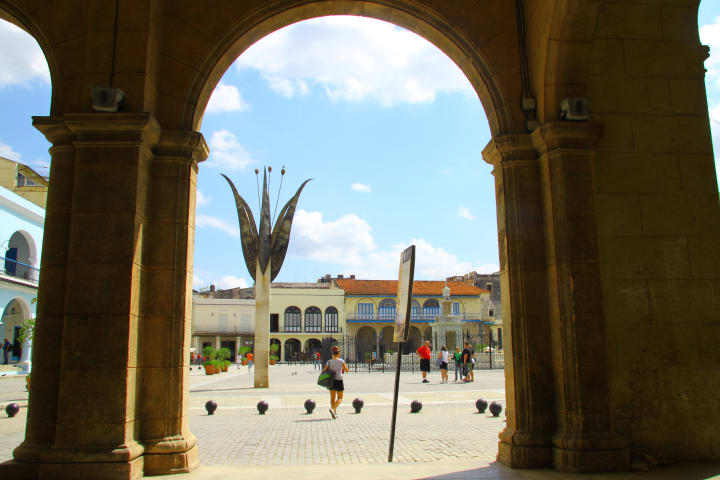
We rode the rattling elevator back down to the street. A vendor sold coconut husks packed with ice cream from a cart, and we sat in the shade of some concrete columns to eat it. A Cuban boy ran back and forth in front of us, tossing his shirt up in the air, then chasing and catching it. A solitary game that was strangely touching.
Maybe his mother wasn’t lucky enough to get one of the coveted hospitality jobs educated Cubans aspire to, serving drinks and cleaning the rooms of spoiled tourists like us. He wouldn’t get to play with the dollar store toys we brought with us. But he was totally absorbed in a game of his own, his eyes shining with joy in the golden Havana sun.
He may never get to travel like we do, to see the world for himself the way we all should be allowed to see it. Maybe he’ll never realize he lives in one of the most beautiful cities in the world.
About the Creator
Ryan Frawley
Towers, Temples, Palaces: Essays From Europe out now!
Novelist, entomologist and cat owner. Ryan Frawley is the author of many articles and stories and one novel, Scar, available from online bookstores everywhere.

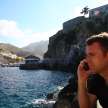




Comments
There are no comments for this story
Be the first to respond and start the conversation.